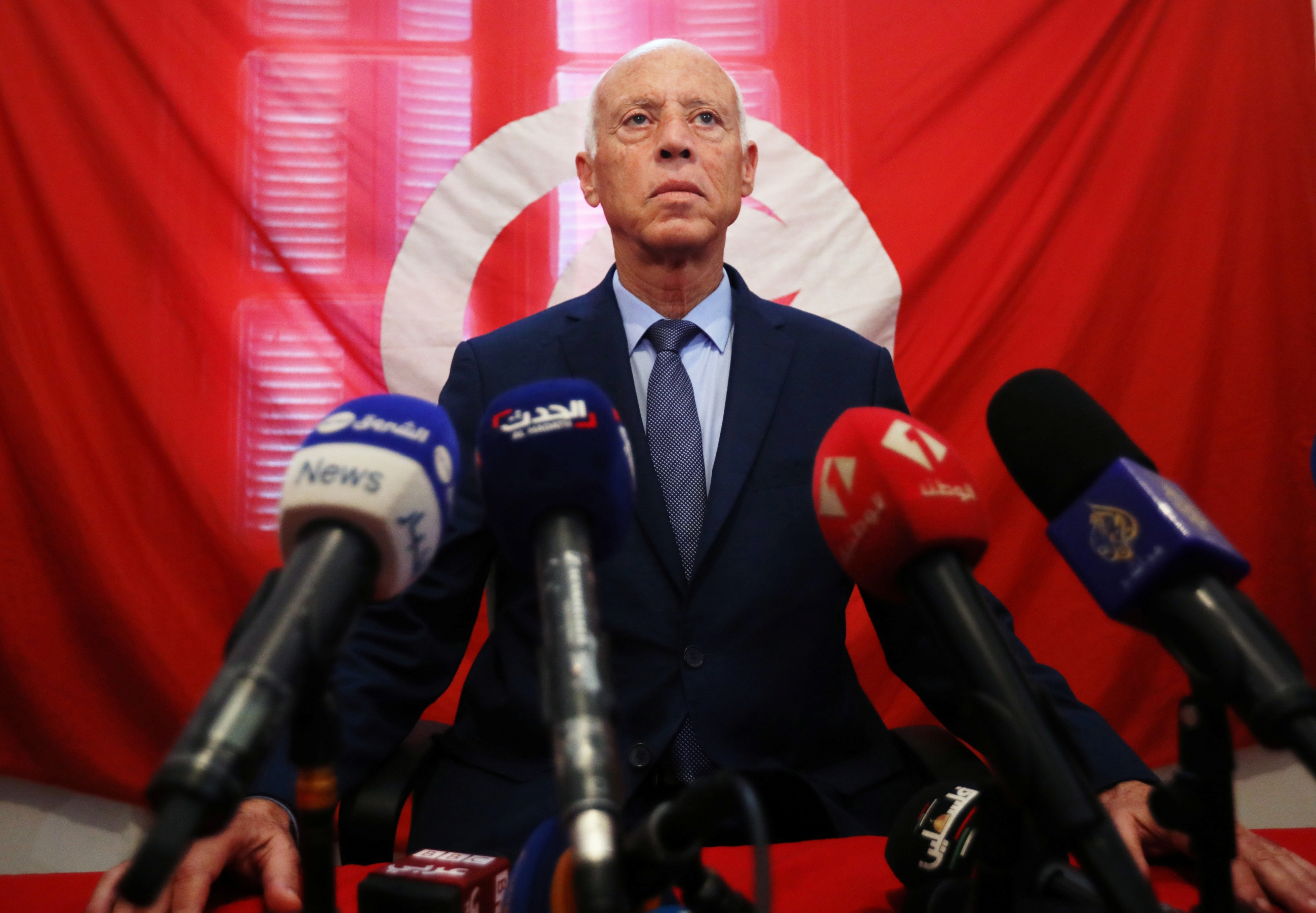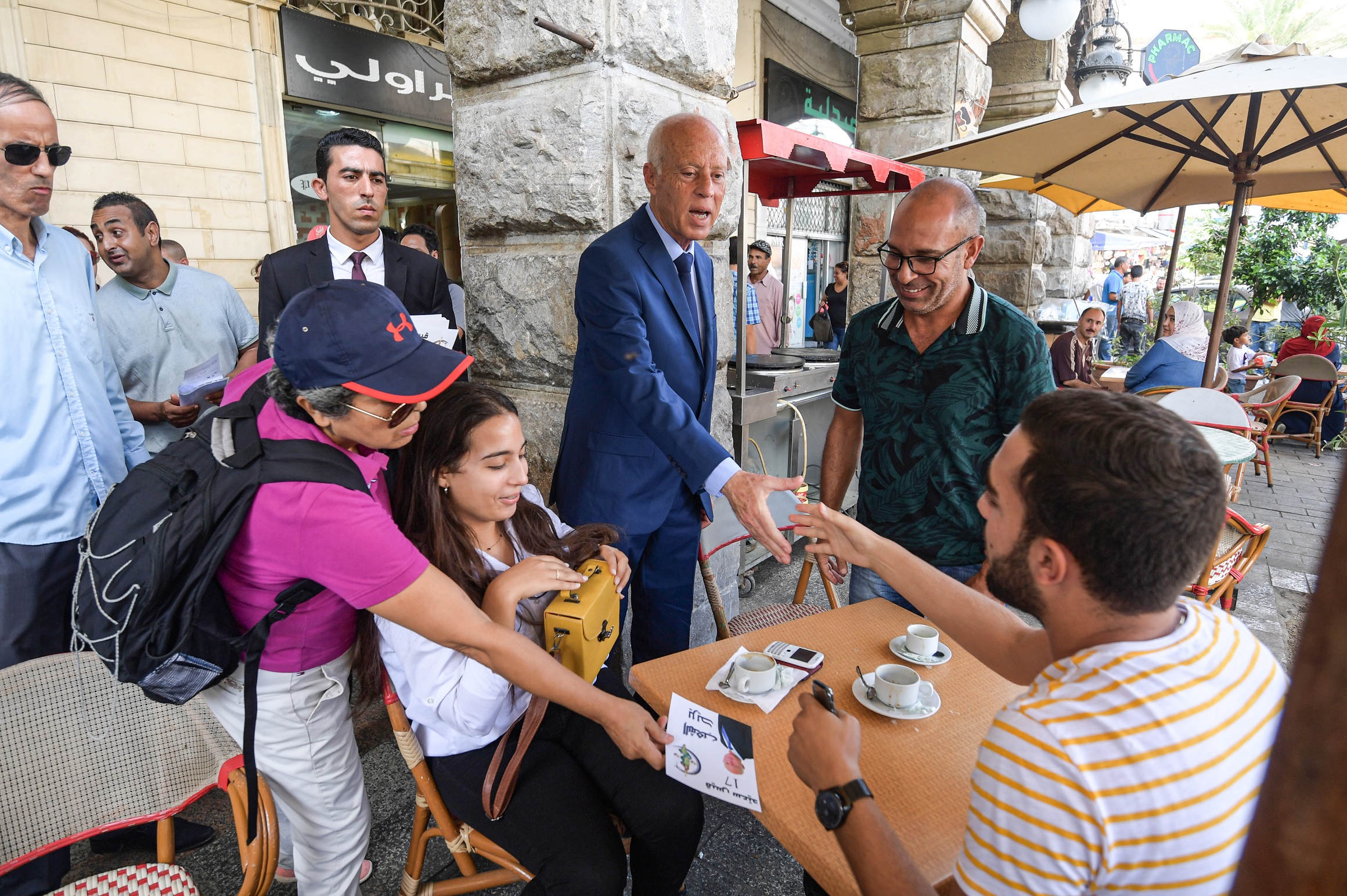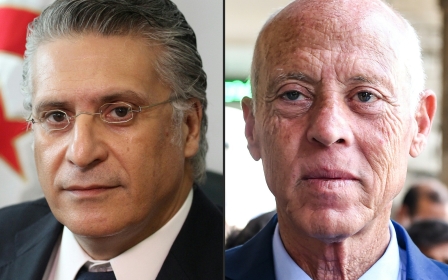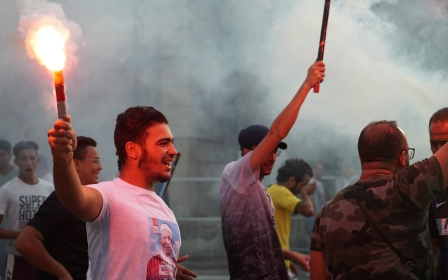Kais Saied, the conservative ‘utopian’ leading Tunisia’s electoral revolt

During the first round of presidential voting on Sunday night, an electoral tsunami of economic rage and disenchantment with Tunisia's reigning political class swept away the titans of Tunisia's post-Arab Spring order.
In a stunning rebuke to national elites, well-funded representatives of Tunisia's two established political trends - moderate Islamism and big-tent secularism - were wiped from the electoral landscape in the course of a single day. Falling into line behind a broader global trend, Tunisian voters appeared to punish well-known entities, instead selecting two political outsiders for a planned runoff vote next month.
Riding atop the crest of this wave with 18.4 percent of the vote, ahead of imprisoned media mogul Nabil Karoui, was the enigmatic jurist and constitutional law professor, Kais Saied.
If a new era of Tunisian politics is dawning, its murky contours are now embodied in the complex person of Saied. With the second round poised to send voters into uncharted waters, intense interest has quickly gathered over the man who may soon wield executive power in the Arab world's sole fledgling democracy to have emerged from the Arab Spring protests.
Humble politics
The 61-year-old Saied is the ultimate outsider. Virtually unknown to the public just a year ago, he is devoid of any prior political experience. As an independent candidate, he is also running without the backing of an established party or apparent electoral machine.
Gathering 10,000 Tunisian dinar (about $3,500) from friends and family to pay a deposit required of candidates by Tunisia’s electoral body, Saied launched a shoestring campaign in which he shunned public funding. Reportedly relying on no more than 15 staff, his tiny electoral operation knocked on doors and largely eschewed television or radio ads.
Longtime political commentators have found themselves baffled by the candidate’s meteoric rise from obscurity, on the back of a campaign that was largely invisible in the arena of traditional media.
'He is appealing to people who think we need a revolution in this country that radically changes the way things are done'
- Youssef Cherif, Columbia Global Center
“He was a surprise to most of us”, says Youssef Cherif, head of the Columbia Global Center in Tunisia. “For many, he was never considered a serious candidate.”
Nicknamed "Robocop" by some for his stoic, mechanical speaking style, didactically sprinkled with frequent allusions from Arabic literature, Saied at first glance appears an unlikely figure to emerge at the vanguard of a disruptive political revolution.
His stances on many current political questions remain clouded in uncertainty. Surveying the platforms of all major candidates, Tunisian publication Le Manage found that Saied had failed to take a clear position on 24 out of 25 policy proposals they studied, making him among the least understood candidates to seek the presidency.
Where he has been doggedly consistent is in his fierce denunciation of Tunisia’s culture of corruption.
The political movement he founded appears built largely on his rock solid image of personal incorruptibility. A long-term university law professor who advised the government during the drafting of the 2014 constitution, Saied has an unmatched legal mind and he sees law and order as a mooring to steady Tunisia through its current period of economic turmoil.
The candidate has gone to great lengths in presenting himself as a humble public servant, and for many of his supporters, that is an intrinsic part of the charm.
“He is modest, humble, and he is also known to be clean without any corruption charges,” says Cherif.
“That is definitely not the case with his opponent, Nabil Karoui,” he adds, referring to Saied’s second-round challenger who remains in prison on charges of tax fraud.
Saied’s ‘utopian' revolution
Beneath Saied’s stoic demeanour and dedication to constitutional law however, he also advocates some genuinely disruptive ideas. Although outlined only vaguely by the candidate, his vision appears to have the potential to fundamentally remake the Tunisian state.
Cherif calls Saied a conservative idealist, running on utopian themes of radical state decentralisation at home, and aspirational pan-Arab unity abroad.
Saied envisions transforming Tunisia into a federation, incorporating aspects of direct democracy, and empowering local councils that would wield significant regional autonomy in this new system. These changes would usurp Tunisia’s current system of legislative elections, which he proposes to eliminate altogether.
“It’s about completely changing the political configuration of Tunisia”, says Cherif. “He is appealing to people who think we need a revolution in this country that radically changes the way things are done.”
“I think it’s closer to the utopian vision of [Muammar] Gaddafi than the working model of Switzerland,” he says of the proposed constitutional changes, referring to the former Libyan autocrat’s early vision of a decentralised tribal federation.
Others close to Saied say that commentators have misunderstood the candidate’s legal ideology.
Nidhal Mekki has known Said for over 20 years, having studied constitutional law under Saied at the Faculty of Law in Tunis and later worked as his research assistant.
He says the candidate has long inspired an impassioned following among young, utopian-minded students, describing him as a man “haunted by an idea”.
“Mr Saied has some reservations about representative democracy as it is practised and experienced in Tunisia,” says Nidhal. “He is not against it categorically, but he would like to correct it by introducing a dose of direct democracy.”
'Mr Saied's colleagues who know him best describe him as a utopian. I would say he is a dreamer'
- Nidhal Mekki
While declining to call him a revolutionary seeking to dismantle the political system, he believes that Saied will seek transformational changes as president. Nidhal describes Saied as a popular reaction not just against corruption, but also against what he sees as a lack of vision that has plagued Tunisian politics.
“Many Tunisians especially youth have chosen, supported and voted Kais Saied even if they do not subscribe to every part of his programme, and even if they do not share some of his positions.”
“Mr Saied's colleagues who know him best describe him as a utopian," Ndhal added. “I would say he is a dreamer.”
A revolution of the right
While the changes Saied champions would represent a paradigm shift in politics, the revolution he seeks is right-wing in nature. Even though his rhetoric and candidacy do not fit the traditional definition of political Islam, Saied is indisputably a social conservative.
According to Cherif, many of Saied’s stances bear much resemblance to conservative nationalists like Russian President Vladimir Putin: sometimes evoking homophobic rhetoric, he espouses a deep hostility towards foreign funding of Tunisian civil society groups, a stance almost certain to invite conflict with Western donor countries.
'Saied is a dangerous person for our community, who believes that homosexuality is a perversion imported from the West'
- Mounir Baatour, LGBTQI activist
The candidate has also been unequivocal in his support for the death penalty, which Tunisia has not implemented since 1991.
Other proposals he has endorsed, such as rejecting a bill mandating equal inheritance for women and criminally punishing public displays of affection between couples, resemble or even fall well to the right of the Islamist Ennahda Party.
Amid a sense of halting progress towards LGTBQI rights since the Arab Spring ignited in 2011, the prospect of a Saied presidency has evoked palpable fear among vulnerable communities in Tunisia. His comments about homosexuality have set off alarm bells among activists and civil rights organisations.
Saied has repeatedly claimed that homosexuality, which is still punishable by up to three years in prison, is being funded and advanced in the nation by secretive foreign funding, which he ties to imperialism and international aid for humanitarian organisations in Tunisia.
“Saied is a dangerous person for our community, who believes that homosexuality is a perversion imported from the West,” says Mounir Baatour, who founded the LGTBQI rights organisation Shams, and campaigned as Tunisia’s first openly gay presidential candidate in this year’s first round vote.
“Many of his ideas approach those of Salafists,” he adds, referring to a hardline branch of Islamist theology. “He is worse than the Ennahda Party.”
Despite Saied’s rhetoric and transformative vision of turning Tunisia into a socially conservative, decentralized state, the powers delegated to the presidency are limited.
While his candidacy has stirred a passionate following among Tunisia's youth and university educated voters, his path to implementing any part of this vague but ambitious agenda is likely to come up against strong headwinds.
As a conservative independent president, without the backing of an established party, Saied will find himself in an unprecedented position for an Arab leader.
“The thing with utopian candidates is they have a lot of ideas in the beginning, but then they are faced with reality,” says Cherif. “Saied will be constrained by the next parliament.
“He is going to face a lot of opposition.”
Middle East Eye propose une couverture et une analyse indépendantes et incomparables du Moyen-Orient, de l’Afrique du Nord et d’autres régions du monde. Pour en savoir plus sur la reprise de ce contenu et les frais qui s’appliquent, veuillez remplir ce formulaire [en anglais]. Pour en savoir plus sur MEE, cliquez ici [en anglais].





